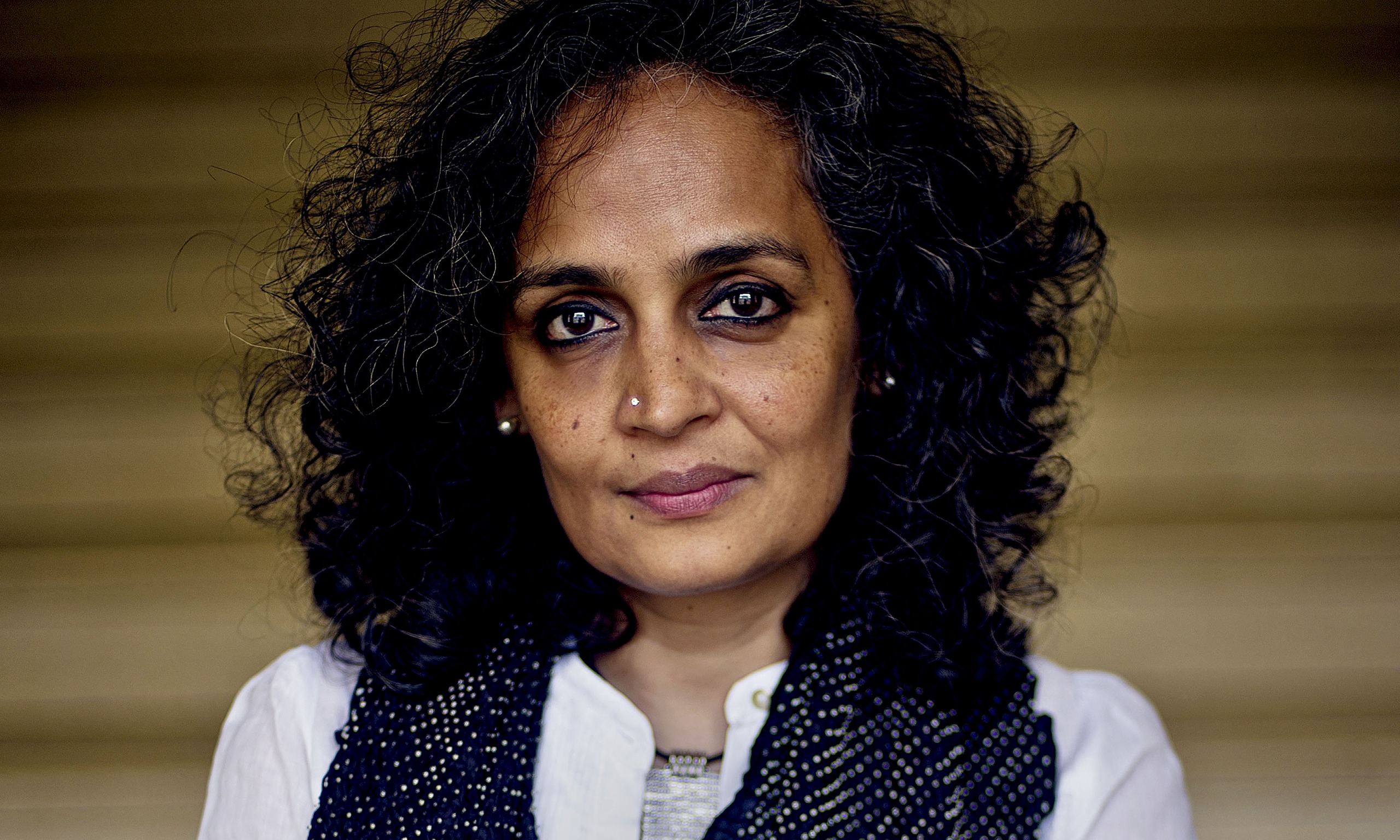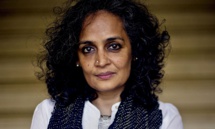"The God of Small Things" was about a family and a village. It was a story of decline, of being different, of exclusion and the injustices of the caste system.
The new novel, on the Booker long list for 2017, is also about people who feel different and excluded – but on a much bigger canvas and reflects Roy's journey in the past two decades as an activist.
The protagonists are transgender women, Muslims, members of the lower caste and rebels fighting for independence in Kashmir.
Roy talks to dpa about her latest book, her beliefs and her fears for the future. Excerpts:
dpa: What was the genesis of the new novel?
Roy: The genesis is really just visitations by all these folks in the book. It really just started performing in my head. All the work that I've been doing in the last 20 years ... those were arguments, but this is a universe, a very different thing. A universe that I became familiar with through those journeys and through the life I've led. I didn't think that there was anything other than fiction that could construct this universe.
So I started working on it, and it was also partly experimental in that I felt that maybe fiction and its form needs to be challenged a bit to deal with our times, which are shattered and spiky. You can't come up with something neat, with a bow around it, because of the way things are, especially over here.
dpa: It was not a conscious decision not to write another novel between "The God of Small Things" and this one, right?
Roy: Not at all. What is a conscious decision is that I never felt it was my duty to write books at regular intervals or novels at regular intervals ... It's something to do with imagination and visitation and wildness. I have nothing against people producing a lot of novels, but I just wanted to write one if and when I had a book to write.
dpa: How does this visitation by the characters work? Does it happen after you've met certain people?
Roy: Almost all the characters are sort of partially inspired by or based (on people). But sometimes it literally feels like they just hang around my house and smoke and have opinions and things like that.
dpa: Did you worry about expectations because of the success of "The God of Small Things"?
Roy: I think 20 years was a long time to forget about that. I did think that people who were expecting 'The Son of the God of Small Things' or 'The God of Small Things 2' might get a bit taken aback, because it's so different. But that wasn't a worry really, because if you were that person who was trying to live up to people's expectations, I don't think I would have written a single thing that I've written.
dpa: In terms of the characters you write about, do you feel a kinship with outsiders and people who are discriminated against?
Roy: It's not about discrimination. The way I explain it is that from the outside, especially from the Western world, India is often described as this cuddly democracy, a bit wild and anarchic and Bollywood-y and all that, but truthfully it's the opposite of that.
Everybody lives in this very fine mesh of caste. There's not even 5 per cent who marry outside their caste. The anarchy might be as far as traffic or income tax returns and all that, but socially it's not an anarchy.
dpa: Do you find that there are a lot of places for people who do not exactly fit in, or do you think it is especially hard for people who are different to thrive in India?
[The main characters in her new novel find refuge at Jannat (Paradise) Guesthouse, built by a transgender woman over graves in a Muslim cemetery in Old Delhi.]
Roy: If you're asking me whether there are many Jannat Guest Houses - no, there aren't. And is it a coincidence that it's in a graveyard? No, it's not. Because many of us are being pushed there in some way or another, to stage a comeback, if we can, some day. In some ways, I feel like all the human race is in a graveyard, if you think about climate change and what's going on. We might not know it or want to see it, but we are.
dpa: You came to Delhi when you were 16 and never left. What do you like about it so much?
Roy: Delhi is like this river with a lot of toxic stuff floating on the top. Obviously, it's a city that everyone loves to hate. The air is terrible. Then you have the whole thing of diplomats and parties and government and power and all that. But underneath that, you have this part (Old Delhi) and you have this old history.
You have a pretty defiant citizenry that doesn't cave in. I love many people who live here. We are a group of strange creatures ... I find that I enjoy somehow the intellectual climate of this underground. It's also the place, like in the novel, where so many movements pass through. Everyone passes through here - Maoists and Kashmiris and everything.
dpa: Can you imagine circumstances in which the political situation in India gets so bad that you would want to leave?
Roy: Of course things are getting very bad. That question is not a theoretical one. But I feel like a tree. I would be transplanted somewhere. I wouldn't be happy. My leaves would fall. Not because I'm a patriot or any such thing, but because I'm as complicated a writer as I am.
------------------------------------------------------------------------------------------------------------------
The new novel, on the Booker long list for 2017, is also about people who feel different and excluded – but on a much bigger canvas and reflects Roy's journey in the past two decades as an activist.
The protagonists are transgender women, Muslims, members of the lower caste and rebels fighting for independence in Kashmir.
Roy talks to dpa about her latest book, her beliefs and her fears for the future. Excerpts:
dpa: What was the genesis of the new novel?
Roy: The genesis is really just visitations by all these folks in the book. It really just started performing in my head. All the work that I've been doing in the last 20 years ... those were arguments, but this is a universe, a very different thing. A universe that I became familiar with through those journeys and through the life I've led. I didn't think that there was anything other than fiction that could construct this universe.
So I started working on it, and it was also partly experimental in that I felt that maybe fiction and its form needs to be challenged a bit to deal with our times, which are shattered and spiky. You can't come up with something neat, with a bow around it, because of the way things are, especially over here.
dpa: It was not a conscious decision not to write another novel between "The God of Small Things" and this one, right?
Roy: Not at all. What is a conscious decision is that I never felt it was my duty to write books at regular intervals or novels at regular intervals ... It's something to do with imagination and visitation and wildness. I have nothing against people producing a lot of novels, but I just wanted to write one if and when I had a book to write.
dpa: How does this visitation by the characters work? Does it happen after you've met certain people?
Roy: Almost all the characters are sort of partially inspired by or based (on people). But sometimes it literally feels like they just hang around my house and smoke and have opinions and things like that.
dpa: Did you worry about expectations because of the success of "The God of Small Things"?
Roy: I think 20 years was a long time to forget about that. I did think that people who were expecting 'The Son of the God of Small Things' or 'The God of Small Things 2' might get a bit taken aback, because it's so different. But that wasn't a worry really, because if you were that person who was trying to live up to people's expectations, I don't think I would have written a single thing that I've written.
dpa: In terms of the characters you write about, do you feel a kinship with outsiders and people who are discriminated against?
Roy: It's not about discrimination. The way I explain it is that from the outside, especially from the Western world, India is often described as this cuddly democracy, a bit wild and anarchic and Bollywood-y and all that, but truthfully it's the opposite of that.
Everybody lives in this very fine mesh of caste. There's not even 5 per cent who marry outside their caste. The anarchy might be as far as traffic or income tax returns and all that, but socially it's not an anarchy.
dpa: Do you find that there are a lot of places for people who do not exactly fit in, or do you think it is especially hard for people who are different to thrive in India?
[The main characters in her new novel find refuge at Jannat (Paradise) Guesthouse, built by a transgender woman over graves in a Muslim cemetery in Old Delhi.]
Roy: If you're asking me whether there are many Jannat Guest Houses - no, there aren't. And is it a coincidence that it's in a graveyard? No, it's not. Because many of us are being pushed there in some way or another, to stage a comeback, if we can, some day. In some ways, I feel like all the human race is in a graveyard, if you think about climate change and what's going on. We might not know it or want to see it, but we are.
dpa: You came to Delhi when you were 16 and never left. What do you like about it so much?
Roy: Delhi is like this river with a lot of toxic stuff floating on the top. Obviously, it's a city that everyone loves to hate. The air is terrible. Then you have the whole thing of diplomats and parties and government and power and all that. But underneath that, you have this part (Old Delhi) and you have this old history.
You have a pretty defiant citizenry that doesn't cave in. I love many people who live here. We are a group of strange creatures ... I find that I enjoy somehow the intellectual climate of this underground. It's also the place, like in the novel, where so many movements pass through. Everyone passes through here - Maoists and Kashmiris and everything.
dpa: Can you imagine circumstances in which the political situation in India gets so bad that you would want to leave?
Roy: Of course things are getting very bad. That question is not a theoretical one. But I feel like a tree. I would be transplanted somewhere. I wouldn't be happy. My leaves would fall. Not because I'm a patriot or any such thing, but because I'm as complicated a writer as I am.
------------------------------------------------------------------------------------------------------------------









 Home
Home Politics
Politics











